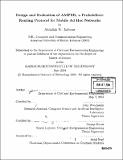Design and evaluation of AMPER : a probabilistic routing protocol for mobile ad hoc networks
Author(s)
Jabbour, Abdallah W. (Abdallah Wahib), 1980-
DownloadFull printable version (3.719Mb)
Alternative title
Ad hoc, Modular, Probabilistic, Enhanced Routing
Other Contributors
Massachusetts Institute of Technology. Dept. of Civil and Environmental Engineering.
Advisor
John Wroclawski.
Terms of use
Metadata
Show full item recordAbstract
An ad hoc network is a group of mobile nodes that autonomously establish connectivity via multi-hop wireless links, without relying on any pre-configured network infrastructure. Traditional ad hoc routing protocols use a large number of routing packets to adapt to network changes, thereby reducing the amount of bandwidth left to carry data. Moreover, they route data packets along a single path from source to destination, which introduces considerable latency for recovery from a link failure along this path. Finally, they often use the minimum hop count as a basis for routing, which does not always guarantee a high throughput. This thesis presents AMPER (Ad hoc, Modular, Probabilistic, Enhanced Routing), an ad hoc routing protocol that minimizes the routing packet overhead, allows the use of alternate paths in the event of a link outage, and employs - without loss of generality - the expected number of transmissions to make forwarding decisions. Following the design of AMPER, ns-2 is used to simulate it, evaluate it and compare it to other ad hoc routing protocols.
Description
Thesis (S.M.)--Massachusetts Institute of Technology, Dept. of Civil and Environmental Engineering, 2004. Includes bibliographical references (p. 89-91).
Date issued
2004Department
Massachusetts Institute of Technology. Department of Civil and Environmental EngineeringPublisher
Massachusetts Institute of Technology
Keywords
Civil and Environmental Engineering.